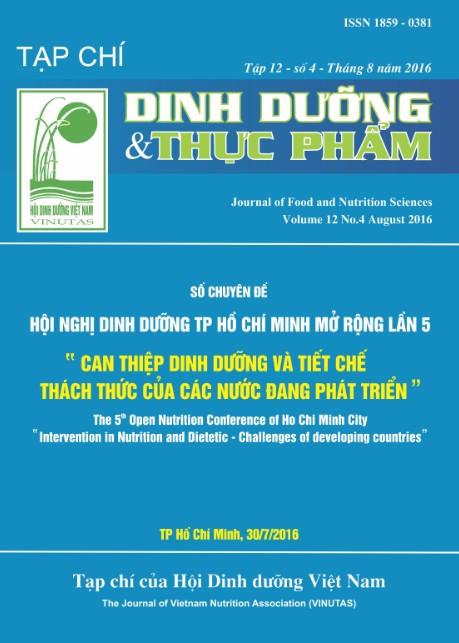KNOWLEDGE AND COMPLIANCE WITH THERAPEUTIC DIET OF PATIENTS WITH CHRONIC NON-COMMUNICABLE DISEASES IN BINH CHANH DISTRICT HOSPITAL IN HO CHI MINH CITY
Main Article Content
Abstract
Knowledge and compliance with therapeutic diets of patients with chronic non-communicable diseases are essential, because nutrition contributes to effective treatment of
the patients. Objective: To assess proportion of patients knowing the benefits of dietary
therapy; proportion of patient’s compliance with therapeutic diets during inpatient treatment at the hospital, and proportion of patient’s compliance with therapeutic diets at home. Methods: Descriptive cross-sectional study on patients with chronic non-communicable diseases hospitalized in Binh Chanh district hospital was conducted. The study was carried out by direct interviewing of 200 patients with structured questionnaires. Results: 58% patients with chronic non-communicable diseases knew the benefits of diet therapy, 27% of patients complied with therapeutic diet during inpatient treatment in hospital, and 21% of patients complied with the diets at home. There were associations between age, gender, education level, family income and knowledge and compliance with therapeutic diets.
Conclusions: Dietary knowledge and compliance of patients with chronic non-communicable diseases is very low. Beside income, insurance policies also have a profound affect on dietary therapy at home and in hospital.
Keywords
Knowledge, therapeutic diet, chronic non-communicable disease
Article Details
References
2. Đỗ Thị Ngọc Diệp, Phan Nguyễn Thanh Bình, Trần Quốc Cường, Lê Thị Kim Quí và Lê Nguyễn Trung Đức Sơn (2012). Dịch tễ học bệnh đái tháo đường tại TPHCM và một số yếu tố liên quan. Tạp chí Dinh dưỡng và Thực phẩm 8 (4), 73-79.
3. EbrahimS, Pearce N, Smeeth L, Casas JP, Jaffar S, et al. (2013). Tackling Non-Communicable Diseases In Low- and MiddleIncome Countries: Is the Evidence from High-Income Countries All We Need?. PLOS Med 10(1): e100137 doi:10.1371/journal.pmed.1001377.
Similar Articles
- Thi Hanh VU, Thi Nguyet THAN, Thi Thu Huyen NGO, NUTRITIONAL STATUS OF PEDIATRIC PATIENTS IN THE HANOI REHABILITATION HOSPITAL IN 2016 , Vietnam Journal of Nutrition & Food: Vol. 13 No. 4 (2017)
You may also start an advanced similarity search for this article.


